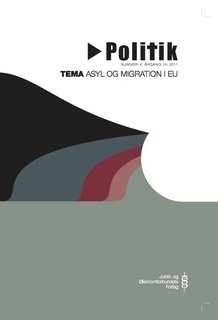Solidarity (In)action?
DOI:
https://doi.org/10.7146/politik.v14i4.27495Resumé
This article assesses the claim that the EU secures basic rights for citizens and migrants because externalization facilitates solidarity between EU states, third countries and migrants (the EFS-argument). However, it is argued that practices like European Commission (EC)-donations to UNHCR, the outsourcing to Private Security Companies (PSCs) like Finmeccanica or the subsidising of EUROSUR-projects do not facilitate solidarity. Rather they place the largest responsibility for refugees on the world’s poorest states, and consolidate the criminalization of irregular migration. Furthermore, Dublin-concepts like “safe third countries” (STCs) and “first country of arrival” are criticized for being instrumentalised by Northern European states’ to defect responsibility for migrants. The EU border control has thus developed into a transnational regime that systematically creates border-induced displacement of migrants. Consequently, a critical evaluation of the EFS-argument reveals a grave inconsistency between the EU’s stated value and the consequences of externalization.
Downloads
Publiceret
Citation/Eksport
Nummer
Sektion
Licens
Forfattere, der publicerer deres værker via dette tidsskrift, accepterer følgende vilkår:
- Forfattere bevarer deres ophavsret og giver tidsskriftet ret til første publicering, samtidigt med at værket er omfattet af en Creative Commons Attribution-licens, der giver andre ret til at dele værket med en anerkendelse af værkets forfatter og første publicering i nærværende tidsskrift.
- Forfattere kan indgå flere separate kontraktlige aftaler om ikke-eksklusiv distribution af tidsskriftets publicerede version af værket (f.eks. sende det til et institutionslager eller udgive det i en bog), med en anerkendelse af værkets første publicering i nærværende tidsskrift.
- Forfattere har ret til og opfordres til at publicere deres værker online (f.eks. i institutionslagre eller på deres websted) forud for og under manuskriptprocessen, da dette kan føre til produktive udvekslinger, samt tidligere og større citater fra publicerede værker (se The Effect of Open Access).

